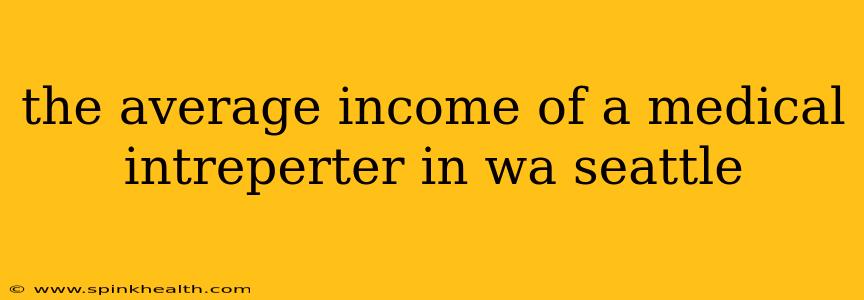Decoding the Dollars: What Medical Interpreters in Seattle, WA, Really Earn
The bustling city of Seattle, a hub for innovation and healthcare, also boasts a significant demand for skilled medical interpreters. But what does this translate to in terms of salary? It's not a simple answer, as the average income of a medical interpreter in Seattle, WA, depends on several factors, making it more of a fascinating puzzle than a straightforward number. Let's delve into the details and piece together a clearer picture.
What Factors Influence a Medical Interpreter's Salary in Seattle?
Several key elements contribute to the wide range of salaries medical interpreters can expect in Seattle. Understanding these factors is crucial in grasping the true financial landscape.
-
Experience: Just like in any profession, experience is key. A seasoned interpreter with years of experience translating complex medical terminology and navigating nuanced cultural contexts will command a significantly higher rate than a newcomer.
-
Language Pair: The demand for specific language pairs directly impacts earnings. High-demand languages, like Mandarin, Spanish, or Vietnamese, generally translate to higher pay rates compared to less frequently requested languages. Seattle's diverse population creates a varied demand for interpreters of multiple languages.
-
Setting: The setting where the interpreter works also influences their income. Interpreters employed by hospitals or large healthcare systems often receive a regular salary and benefits package. However, freelance interpreters working independently can earn more per assignment but lack the stability of a steady paycheck and employee benefits.
What is the Typical Hourly Rate for Medical Interpreters in Seattle?
Pinpointing an exact average hourly rate is challenging due to the variability mentioned above. However, sources suggest that freelance medical interpreters in Seattle can often command rates ranging from $30 to $60 per hour, sometimes even exceeding this amount for highly specialized assignments or those requiring immediate availability. Salaried positions, on the other hand, will likely offer a lower hourly rate but with the additional benefits of health insurance, paid time off, and retirement plans.
How Can I Find Medical Interpretation Jobs in Seattle?
Seattle's robust healthcare sector provides plenty of opportunities for medical interpreters. Job postings frequently appear on sites like Indeed, LinkedIn, and specialized healthcare job boards. Networking within the healthcare community and directly contacting hospitals, clinics, and translation agencies can also prove fruitful. Building a strong online presence showcasing language skills and relevant experience is essential in today's competitive job market.
What are the Educational Requirements for Medical Interpreters in Seattle?
While formal certifications aren't always mandatory, they are highly advantageous. Organizations like the National Board of Certification for Medical Interpreters (NBCMI) offer recognized certifications. These certifications demonstrate a high level of competency and can significantly enhance your earning potential. Additionally, a background in healthcare or a related field can be beneficial and increase competitiveness.
What are the Career Prospects for Medical Interpreters in Seattle?
The outlook for medical interpreters in Seattle is positive, fueled by the city’s growing population and the increasing need for accessible healthcare. The demand for interpreters is expected to continue growing in line with an increasingly diverse patient population. Specialization in niche areas of medicine could also boost career prospects and earnings.
Beyond the Numbers: The Rewards of Medical Interpretation
While salary is a crucial factor, remember that a medical interpreter’s role extends beyond the financial aspects. It's a profession that combines language skills with empathy and cultural sensitivity, playing a vital role in ensuring effective healthcare communication and positive patient outcomes. The satisfaction of bridging communication gaps and contributing to better healthcare access can be incredibly rewarding in itself. This makes a career as a medical interpreter not just about the paycheck, but about making a real difference in the lives of others.

